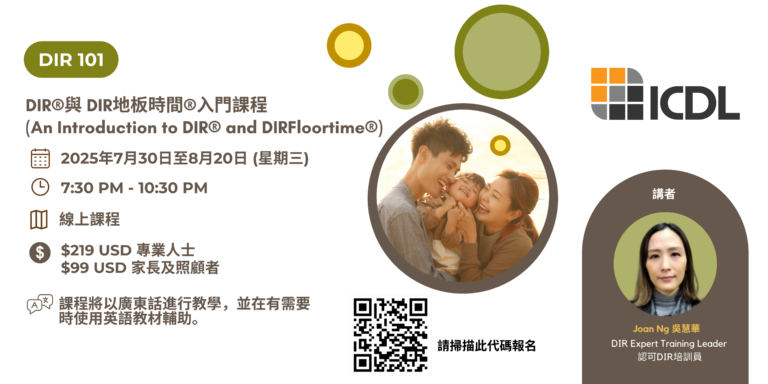
課程名稱:
DIR101:DIR®與 DIR地板時間®入門課程
(An Introduction to DIR® and DIRFloortime®)
日期: 2025年7月30至8月20日 (星期三)
時間: 7:30 PM – 10:30 PM (共12小時)
課程形式: 線上Zoom
授課語言: 課程將以廣東話進行教學,並在有需要時使用英語教材輔助。
課程費用:
專業人士:$219 USD
家長、照顧者及不打算成為DIRFloortime提供者的人士:$99 USD
(需自行申請OTB持續專業發展課程學分)
DIR模型及DIRFloortime
DIR(發展、個體差異、關係)模型是一種以個體為中心的發展模型,旨在促進兒童在情感、社交和認知等各方面的整體發展。DIRFloortime是一種與兒童互動的方式,鼓勵他們在遊戲中發展功能情感發展能力,增強與他人的關係。
課程內容
本課程將探討DIR模型的理論框架及其應用,並重點關注功能情感發展能力(FEDCs),以支持兒童在所有發展領域的成長。
學習目標
參加者將能夠:
更多詳情,請參閱 ICDL 網站。
注意事項
註:DIR 101 為 DIR 201 和 202 課程的必需先修課程,並不能直接取得成為DIRFloortime提供者的資格。
取消政策
請參閱ICDL取消政策。
Course:
DIR 201: Promoting Basic Functional Emotional Developmental Capacities
Date: 3rd June, 2025 to 2nd September. 2025 (Every Tuesdays)
Time: 8:00PM to 10:00 PM
Venue: Zoom Online
Language:English
Instructor: Jackie Bartell & Joan Ng
Fee: Professionals: $849 USD
Prerequisite: DIR 101
Learning Objectives
Big Picture Thinking
Describe the central ideas of each of the first four functional emotional developmental capacities of the DIRFloortime® Model.
Describe at least three basic, discipline-specific concepts related to the following areas: sensory reactivity, processing and motor planning development, receptive and expressive language development, and visual spatial development.
Describe at least three ways to identify and embrace caregivers’ and individuals’ strengths, respecting and promoting their right for self-determination.
Cite scientific evidence supporting the DIRFloortime® approach.
Assessment & Developing Individual Profile
Accurately describe the presence, constrictions, or absence of the first four basic functional emotional developmental capacities in children or adult individuals, with or without developmental disabilities.
Describe at least two unique individual profiles with all of the following components: sensory reactivity, processing and motor planning development, receptive and expressive language development, and visual spatial development in children or adult individuals, with or without developmental disabilities.
Identify at least three individual differences that can both interfere with and facilitate mastery of the first four functional emotional developmental capacities.
Describe the “goodness of fit” (including individual differences, interactive styles, and cultural elements) when supporting caregiver-individual relationships, and when assessing one’s own work with an individual.
Practice: Floortime
Integrate and apply relevant DIR® concepts in Floortime practice, such as: attunement of one’s own affect to the individual, supporting regulation, emotional engagement, reciprocity and intentionality, and complex thinking.
Demonstrate Floortime strategy of following the individual’s lead (defined as the person’s internal intentions, motivations and purposes) leading to gradually increasing duration and complexity of circles of communication.
Demonstrate at least three Floortime techniques that account for individual differences and which lead to longer, more complex circles of communication.
Apply at least four DIRFloortime principles to address and support functional emotional developmental capacities 1 – 4 rather than to control behavior.
Reflective Practice & Professional Identity
Analyze one’s individual differences and functional emotional developmental capacities by describing one’s own preferred interactive styles, regulatory needs, and tendencies under stress related to one’s ability to support individuals in developing FEDCs 1 – 4.
Apply what is learned from self-observations, group discussions, readings, and lectures to expand perspectives on the relationship and use of DIRFloortime practices.
Identify and demonstrate three examples of highly ethical behaviors and standards of practice, such as: adhering to confidentiality requirements and informed consent, demonstrating an understanding of the limits of one’s scope of practice, identifying and reducing bias, and avoiding ableist or otherwise discriminatory terminology.
Apply feedback into practice by adapting practice of DIRFloortime or development of individual developmental profiles.